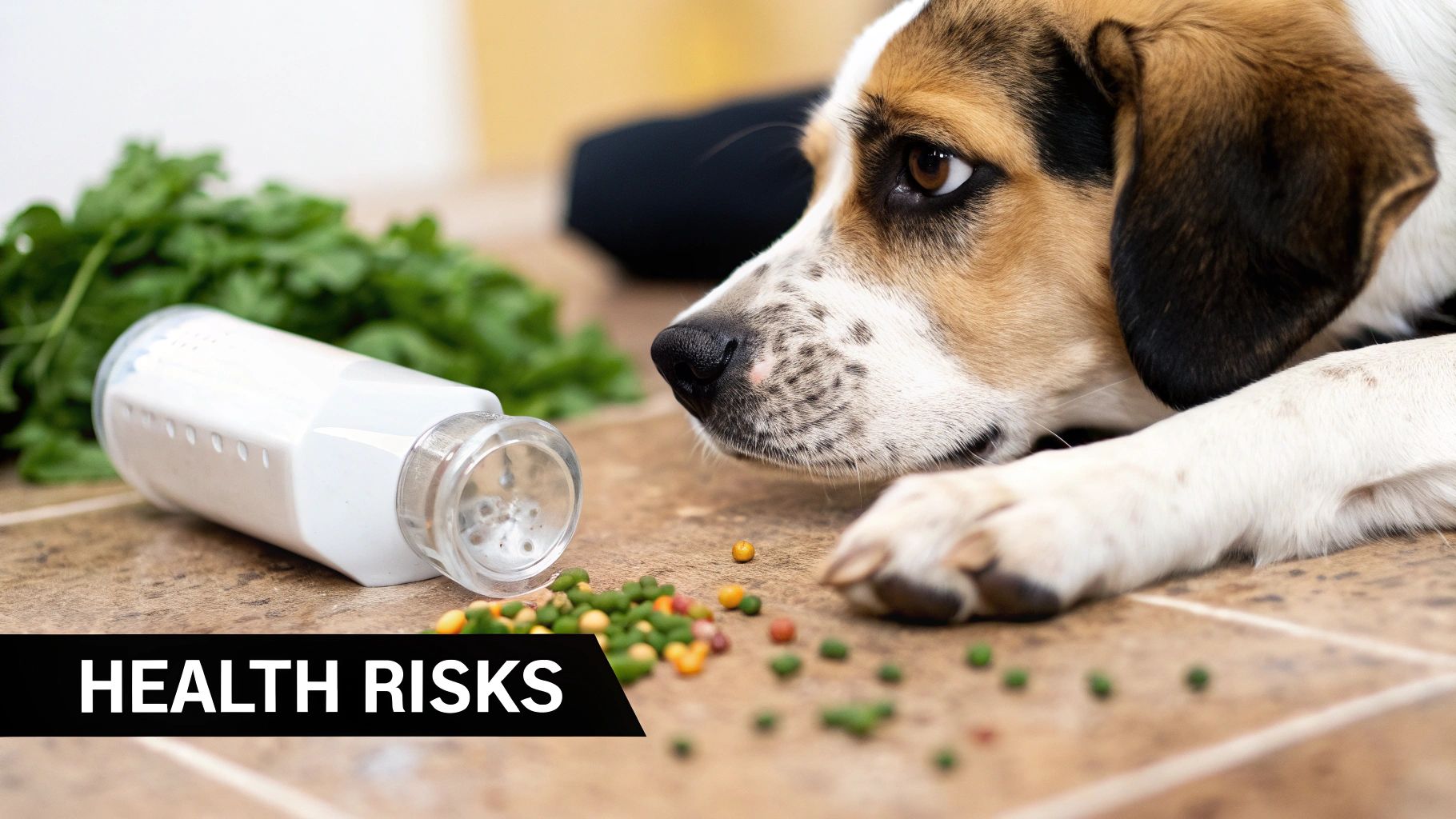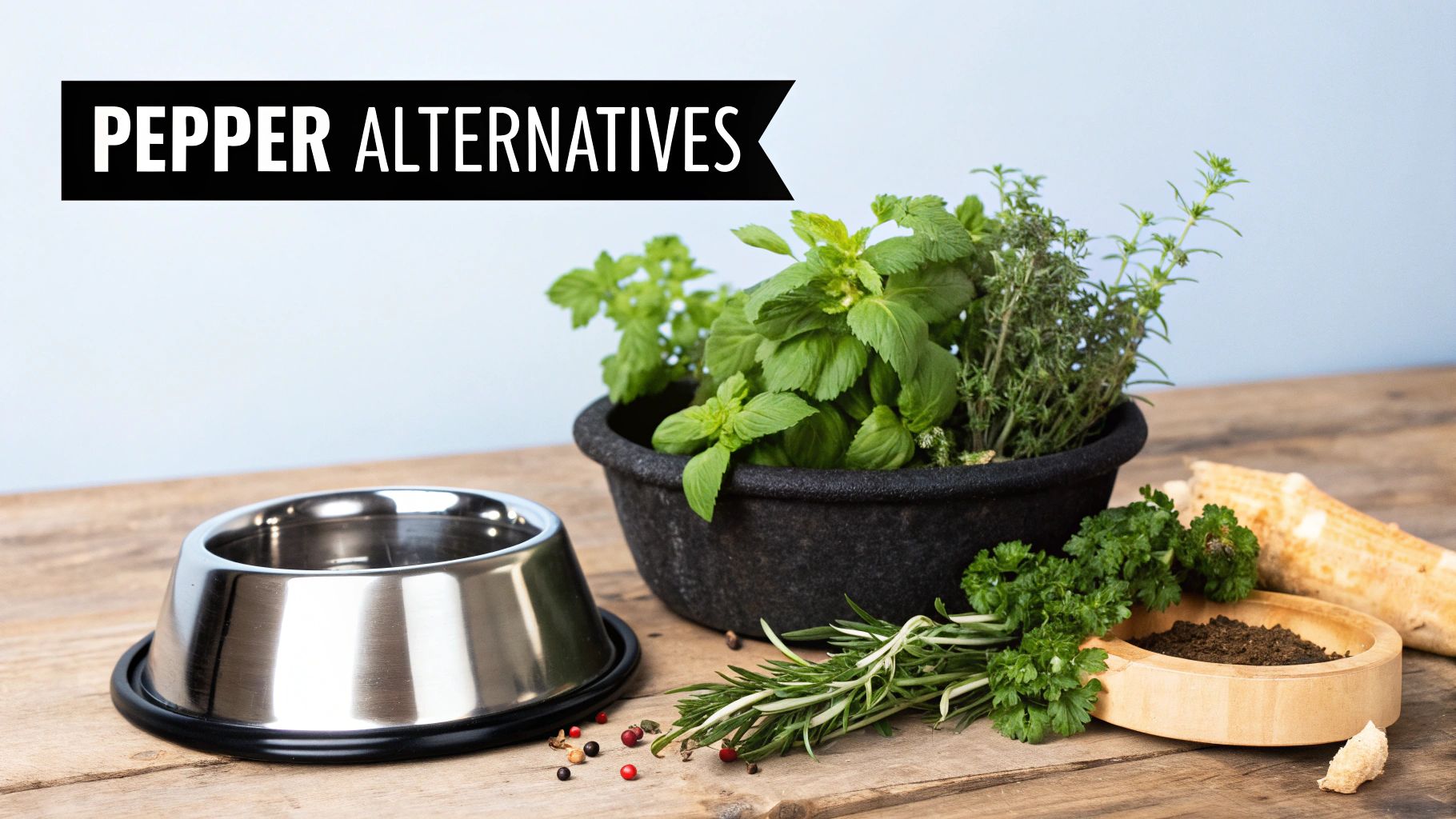
Can Dogs Eat Black Pepper? A Vet-Approved Guide
We've all been there—you're finishing up a delicious, seasoned dinner, and your dog is right there, giving you those irresistible puppy-dog eyes. It's tempting to share, but what about the seasoning? Specifically, can dogs eat black pepper?
The short answer is that while a tiny, accidental taste won't poison them, it's definitely something you should avoid adding to their food bowl. Black pepper isn't a recommended seasoning for dogs simply because it can cause a lot of unnecessary irritation.
Is Black Pepper Safe for Your Dog?

If your dog manages to sneak a lick of a plate with some pepper on it, don't panic. It’s not an emergency. But making it a regular part of their diet? That's a different story and a definite no.
Think about it this way: you wouldn't get sick from eating one super spicy chip, but it might leave your stomach feeling a little off. For dogs, black pepper is a much stronger irritant. The culprit is a compound called piperine, which is responsible for that signature spicy kick we humans often enjoy.
For a quick overview, here's a table summarizing the key safety points.
Black Pepper Safety for Dogs at a Glance
| Aspect | Safety Level | Key Takeaway |
|---|---|---|
| Toxicity | Non-toxic | A small amount is not poisonous to dogs. |
| Irritation Risk | High | The piperine can easily irritate the stomach and respiratory tract. |
| Recommended Use | Avoid | It offers no nutritional benefits and only introduces risks. |
| Accidental Ingestion | Low Concern | A tiny, accidental lick is unlikely to cause serious harm. |
This table shows that while pepper isn't going to cause a life-threatening emergency, the potential for discomfort just isn't worth it.
Why It's Best to Skip the Spice
Dogs have much more sensitive digestive systems than we do. When piperine hits their gut, it can stir up a host of uncomfortable problems. And it's not just about ingestion—the fine powder of ground pepper can easily be inhaled, causing a whole other set of issues.
Here’s a quick rundown of why it's a good idea to keep pepper away from your pup:
- Stomach Upset: Piperine can be harsh on the lining of your dog's stomach and intestines, leading to pain, gas, or diarrhea.
- Breathing Problems: If your dog gets a curious sniff and inhales pepper, it can irritate their nose and lungs, triggering fits of sneezing and coughing.
- No Health Perks: Simply put, black pepper offers zero nutritional value for your dog. It's all risk and no reward.
Unlike truly dangerous seasonings like onions or garlic, black pepper isn't toxic. However, as you can learn from other guides on safe spices for dogs on hepper.com, the piperine can make your dog miserable if they eat too much.
So, while a stray speck won't do any lasting damage, it's best to save the seasoning for the human members of the family. It's an easy way to avoid an upset tummy and keep your dog happy and healthy.
Here’s a rewritten version of the section, crafted to sound like it was written by an experienced human expert.
Why Pepper and Pups Just Don't Mix
So, you're wondering if your dog can have a taste of your peppery steak. The short answer is almost always a firm "no," and the reason comes down to one key compound: piperine.
Piperine is what gives black pepper its classic spicy kick and sharp smell. While we might find that zesty flavor enjoyable, a dog's digestive system has a very different opinion. It’s simply not built to handle that kind of heat.
Think of it this way: for your dog's sensitive gut, piperine is like a harsh irritant. It can really throw their system out of whack, leading to some pretty miserable (and often messy) outcomes for your four-legged friend.
The Tummy Trouble Problem
When a dog eats black pepper, the piperine immediately starts irritating the lining of their stomach and intestines. Their body’s natural reaction is to get rid of the offending substance as quickly as possible.
You'll know they're in distress if you see signs like:
- Belly Aches: Your dog might pace, whine, or do that "prayer" pose with their front legs down and rear in the air, trying to ease the pressure in their abdomen.
- Serious Gas: The gut irritation can cause a sudden, noticeable increase in flatulence.
- Diarrhea: The body's fastest way to flush out an irritant is often through loose, watery stools.
- Vomiting: If the stomach is particularly irritated, your dog may throw up to get the pepper out.
The bottom line is that piperine makes black pepper an agitating ingredient for dogs. It’s not poisonous, but the level of discomfort it causes is significant and completely unnecessary.
The Sneaky Sniffing Hazard
Beyond an upset stomach, there's another danger that’s easy to overlook, especially with finely ground pepper. If your curious pup gets a little too close to your dinner plate or a spill on the floor, they can easily inhale the powder.
Those tiny particles go straight into their respiratory tract, irritating everything from their nose to their lungs. This can trigger a sudden fit of intense sneezing, coughing, and in some cases, even make it hard for them to breathe.
This is especially risky for brachycephalic (flat-faced) breeds. Pups like Pugs, French Bulldogs, and Boxers already have a tougher time breathing due to their anatomy. For them, inhaling an irritant like black pepper can cause much more severe respiratory distress. It’s yet another solid reason to keep the pepper shaker far away from your dog’s reach.
Spotting the Signs of a Bad Reaction

It happens. Maybe your dog got a little too curious with the pepper shaker or licked a plate clean before you could stop them. If so, you'll want to know what to watch for. While a tiny amount isn't likely to cause a huge problem, a bigger dose can definitely lead to some obvious discomfort.
Thankfully, a serious reaction to black pepper is pretty uncommon. In a 2019 review of over 213,000 calls to the ASPCA Poison Control Center, fewer than 0.06% were actually about black pepper. That’s a world away from truly toxic stuff like chocolate or xylitol. Still, it’s always smart to know the signs.
Tummy Troubles and Telltale Signs
The first place you'll likely see a problem is in their gut. Piperine, the compound that gives pepper its kick, can really irritate a dog's stomach.
Keep an eye out for these classic signs of gastrointestinal distress:
- Vomiting or Diarrhea: This is your dog's body trying to get the irritant out, plain and simple.
- Abdominal Pain: You might notice them whining, acting restless, or standing in a "hunched" position to ease the pain in their belly.
- Loss of Appetite: An upset stomach often means they'll turn their nose up at their next meal, even if it's their favorite.
- Increased Gas: A sudden bout of flatulence can also signal digestive upset. For more on this, see our guide on the reasons why your dog has gas.
Respiratory Irritation Signals
If your dog accidentally inhales a cloud of ground pepper, the reaction will look a little different. Those fine particles are a major irritant to their sensitive nose and airways, and the response is usually immediate.
The good news here is that inhalation mostly causes temporary discomfort, not lasting harm. Just keep a close watch and make sure they have fresh air. The symptoms should clear up once they're away from the pepper.
Look for frantic or repeated sneezing, a sudden and persistent cough, or watery eyes as their body works to flush the irritant out.
For most mild cases, whether digestive or respiratory, you can manage things at home. Just offer plenty of fresh water and give them a quiet spot to rest. But if the symptoms seem severe or don't improve after a few hours, it's always best to give your vet a call.
You've just seen your dog sneak a lick from your dinner plate, and your mind races: "How much black pepper was on there? Is he going to be okay?" It's a common worry, and the answer really boils down to one thing: context.
There’s a world of difference between a few leftover specks on a plate and a deliberate shake from the pepper grinder over their food. Think of it like this: a single drop of hot sauce in a giant pot of chili is barely detectable. But if you were to drink that drop straight? You'd definitely feel the burn. For a dog, even a small, intentional dash of black pepper can feel like that straight shot of hot sauce—an intense, irritating jolt to their system.
A Pinch for You Can Be a Pound for Them
Your dog's size is a massive factor in how they'll handle even a tiny amount of pepper. What a 90-pound Great Dane might not even register could easily send a 5-pound Chihuahua into a fit of stomach upset. The smaller the dog, the more potent the effect.
Let's break down some real-world situations:
- A "No-Panic" Moment: Your dog licks a plate that had some pepper-seasoned steak on it. The amount is probably negligible.
- A "Watch and See" Moment: A pepper-crusted piece of meat falls on the floor, and your dog gulps it down before you can react.
- A "Call the Vet" Moment: The pepper shaker gets knocked over, and your dog licks up a noticeable pile.
The bottom line is pretty straightforward. Since black pepper adds no nutritional value for your dog and only brings potential risks, the safest amount is always zero.
While a tiny, accidental taste isn't usually cause for alarm, the goal should always be to avoid it entirely. Keeping in mind that "just a little" for us can be far too much for them is the best way to keep your dog's tummy happy and out of trouble.
Safe And Healthy Flavor Boosters For Your Dog
So, what can you use to spice up your dog’s dinner? Instead of reaching for the pepper, let's look at some fantastic dog-friendly herbs that add a little excitement to their food bowl and even pack a few health benefits.
Think of it this way: a sprinkle of the right herb can turn a boring bowl of kibble into a more engaging meal. For instance, a little bit of fresh, curly-leafed parsley is a time-tested trick for freshening up doggy breath, thanks to its flavonoids and antioxidants. Just make sure to use it sparingly.
Beyond what they eat, good oral hygiene is a cornerstone of your dog's overall health. You can explore effective oral care products for dogs to keep their teeth and gums in top shape.
This chart breaks down the common symptoms dogs might experience if they get into the pepper, showing how often they occur.
As you can see, a sneezing fit is pretty common and usually not a big deal. More severe reactions like vomiting are, thankfully, much less frequent.
Nutrient-Rich Herbs For Your Pup
Many herbs you already have in your kitchen are perfectly safe and even good for your dog, as long as you use them in moderation.
- Turmeric: That bright yellow spice is a powerhouse of anti-inflammatory properties. It's an excellent choice for older dogs with achy joints or very active pups. Just be sure to mix it with a healthy fat like coconut oil to help your dog’s body absorb it.
- Ginger: Got a dog with a sensitive tummy? A tiny pinch of fresh or powdered ginger can work wonders for settling an upset stomach and aiding digestion. It's a fantastic natural remedy for car sickness, too.
- Basil: This sweet, aromatic herb is loaded with antioxidants that support a healthy immune system and help fend off cellular damage. Plus, many dogs seem to love the taste.
Pro Tip: Whenever you introduce a new food or herb, always start small. A tiny pinch is all you need to see how your dog reacts. Moderation is everything—a little bit can be beneficial, but too much can cause problems.
To give you a clearer picture, here’s a quick guide to common seasonings you might have in your kitchen.
Safe vs. Unsafe Seasonings for Dogs
| Seasoning | Safe for Dogs? | Potential Risks or Benefits |
|---|---|---|
| Turmeric | Yes | Benefit: Powerful anti-inflammatory. |
| Ginger | Yes | Benefit: Aids digestion and soothes nausea. |
| Parsley | Yes (curly-leaf) | Benefit: Freshens breath. |
| Basil | Yes | Benefit: Rich in antioxidants. |
| Rosemary | Yes | Benefit: Good source of antioxidants and iron. |
| Cinnamon | Yes (in moderation) | Benefit: Anti-inflammatory properties. |
| Garlic/Onion Powder | NO | Risk: Highly toxic; can damage red blood cells. |
| Salt | NO | Risk: Can lead to sodium ion poisoning. |
| Nutmeg | NO | Risk: Can cause hallucinations and seizures. |
| Cocoa Powder | NO | Risk: Highly toxic to dogs. |
Exploring these safe alternatives is a great way to make mealtime more exciting and nutritious for your best friend. If you're feeling inspired to get creative in the kitchen, check out our guide to healthy dog treat recipes for more fun ideas.
Frequently Asked Questions About Dogs and Spices

Let's clear up some of the common questions and "what if" scenarios that pop up when you're a dog owner navigating the kitchen spice rack. These quick answers should give you peace of mind.
My Dog Licked a Plate with Pepper on It
Deep breath—it’s going to be okay. If your dog just got a quick lick of a plate with a little leftover black pepper, there’s no reason to panic. For most dogs, especially bigger ones, that tiny amount is harmless.
Keep an eye on them and make sure their water bowl is full. You're just watching for any signs of an upset tummy, but honestly, it's pretty unlikely from such a small taste.
Are Other Kinds of Pepper Safe?
Nope, this is a hard pass. It's best to steer your dog clear of all spicy peppers. White pepper is almost identical to black pepper and comes with the same risks of irritation.
Things like cayenne and chili powder are a much bigger problem. They contain capsaicin, which is a powerful irritant that can cause real pain in your dog’s mouth, leading to drooling and some serious stomach upset. You're much better off sticking to dog-friendly herbs. One fantastic option is turmeric, and you can learn more about its benefits for dogs in our detailed guide.
A good rule of thumb is pretty simple: if it tastes spicy to you, it's way too intense for your dog. Their digestive systems just aren't built to handle that kind of heat.
What if My Dog Ate a Whole Peppercorn?
Swallowing a single peppercorn isn't a toxic emergency, but it might be more irritating than the ground stuff as it breaks down. There's also a good chance it will pass right through their system whole.
Just monitor your pup for the next 24 hours. If you see any vomiting, diarrhea, or signs that they're just not comfortable, a quick phone call to your vet is the smartest move. It's always better to be safe than sorry.

